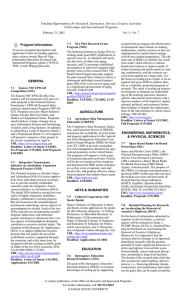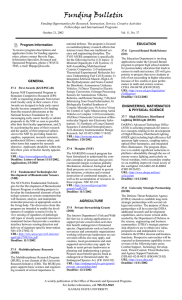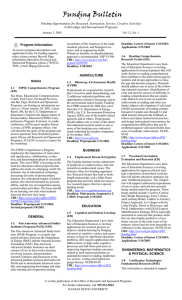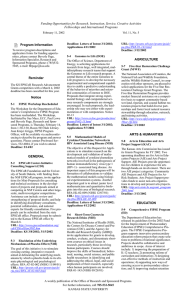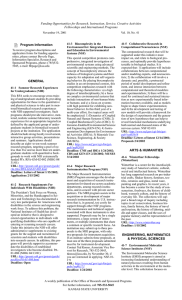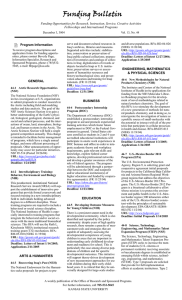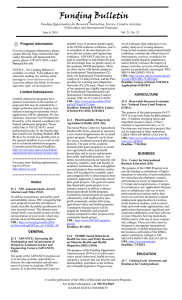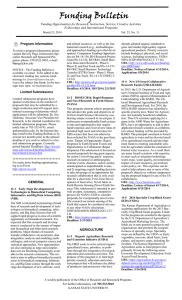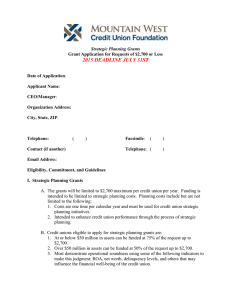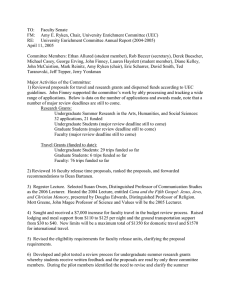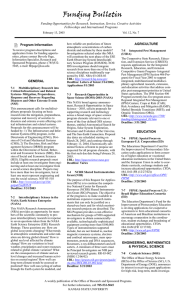Funding Opportunities for Research, Instruction, Service, Creative Activities
advertisement
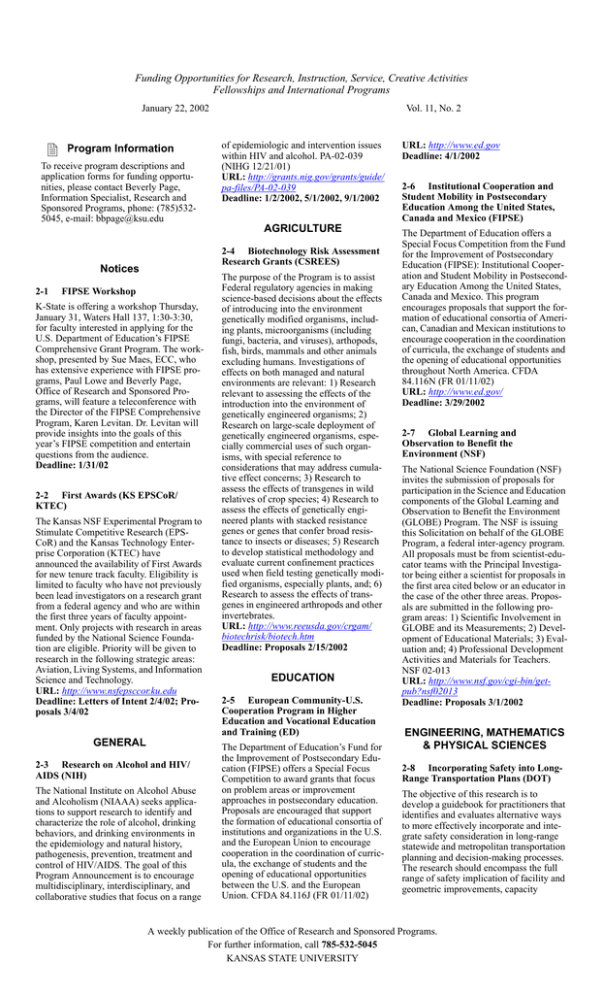
Funding Opportunities for Research, Instruction, Service, Creative Activities Fellowships and International Programs January 22, 2002 Program Information To receive program descriptions and application forms for funding opportunities, please contact Beverly Page, Information Specialist, Research and Sponsored Programs, phone: (785)5325045, e-mail: bbpage@ksu.edu of epidemiologic and intervention issues within HIV and alcohol. PA-02-039 (NIHG 12/21/01) URL: http://grants.nig.gov/grants/guide/ pa-files/PA-02-039 Deadline: 1/2/2002, 5/1/2002, 9/1/2002 AGRICULTURE 2-4 Biotechnology Risk Assessment Research Grants (CSREES) Notices 2-1 Vol. 11, No. 2 FIPSE Workshop K-State is offering a workshop Thursday, January 31, Waters Hall 137, 1:30-3:30, for faculty interested in applying for the U.S. Department of Education’s FIPSE Comprehensive Grant Program. The workshop, presented by Sue Maes, ECC, who has extensive experience with FIPSE programs, Paul Lowe and Beverly Page, Office of Research and Sponsored Programs, will feature a teleconference with the Director of the FIPSE Comprehensive Program, Karen Levitan. Dr. Levitan will provide insights into the goals of this year’s FIPSE competition and entertain questions from the audience. Deadline: 1/31/02 2-2 First Awards (KS EPSCoR/ KTEC) The Kansas NSF Experimental Program to Stimulate Competitive Research (EPSCoR) and the Kansas Technology Enterprise Corporation (KTEC) have announced the availability of First Awards for new tenure track faculty. Eligibility is limited to faculty who have not previously been lead investigators on a research grant from a federal agency and who are within the first three years of faculty appointment. Only projects with research in areas funded by the National Science Foundation are eligible. Priority will be given to research in the following strategic areas: Aviation, Living Systems, and Information Science and Technology. URL: http://www.nsfepsccor.ku.edu Deadline: Letters of Intent 2/4/02; Proposals 3/4/02 GENERAL 2-3 Research on Alcohol and HIV/ AIDS (NIH) The National Institute on Alcohol Abuse and Alcoholism (NIAAA) seeks applications to support research to identify and characterize the role of alcohol, drinking behaviors, and drinking environments in the epidemiology and natural history, pathogenesis, prevention, treatment and control of HIV/AIDS. The goal of this Program Announcement is to encourage multidisciplinary, interdisciplinary, and collaborative studies that focus on a range The purpose of the Program is to assist Federal regulatory agencies in making science-based decisions about the effects of introducing into the environment genetically modified organisms, including plants, microorganisms (including fungi, bacteria, and viruses), arthopods, fish, birds, mammals and other animals excluding humans. Investigations of effects on both managed and natural environments are relevant: 1) Research relevant to assessing the effects of the introduction into the environment of genetically engineered organisms; 2) Research on large-scale deployment of genetically engineered organisms, especially commercial uses of such organisms, with special reference to considerations that may address cumulative effect concerns; 3) Research to assess the effects of transgenes in wild relatives of crop species; 4) Research to assess the effects of genetically engineered plants with stacked resistance genes or genes that confer broad resistance to insects or diseases; 5) Research to develop statistical methodology and evaluate current confinement practices used when field testing genetically modified organisms, especially plants, and; 6) Research to assess the effects of transgenes in engineered arthropods and other invertebrates. URL: http://www.reeusda.gov/crgam/ biotechrisk/biotech.htm Deadline: Proposals 2/15/2002 EDUCATION 2-5 European Community-U.S. Cooperation Program in Higher Education and Vocational Education and Training (ED) The Department of Education’s Fund for the Improvement of Postsecondary Education (FIPSE) offers a Special Focus Competition to award grants that focus on problem areas or improvement approaches in postsecondary education. Proposals are encouraged that support the formation of educational consortia of institutions and organizations in the U.S. and the European Union to encourage cooperation in the coordination of curricula, the exchange of students and the opening of educational opportunities between the U.S. and the European Union. CFDA 84.116J (FR 01/11/02) URL: http://www.ed.gov Deadline: 4/1/2002 2-6 Institutional Cooperation and Student Mobility in Postsecondary Education Among the United States, Canada and Mexico (FIPSE) The Department of Education offers a Special Focus Competition from the Fund for the Improvement of Postsecondary Education (FIPSE): Institutional Cooperation and Student Mobility in Postsecondary Education Among the United States, Canada and Mexico. This program encourages proposals that support the formation of educational consortia of American, Canadian and Mexican institutions to encourage cooperation in the coordination of curricula, the exchange of students and the opening of educational opportunities throughout North America. CFDA 84.116N (FR 01/11/02) URL: http://www.ed.gov/ Deadline: 3/29/2002 2-7 Global Learning and Observation to Benefit the Environment (NSF) The National Science Foundation (NSF) invites the submission of proposals for participation in the Science and Education components of the Global Learning and Observation to Benefit the Environment (GLOBE) Program. The NSF is issuing this Solicitation on behalf of the GLOBE Program, a federal inter-agency program. All proposals must be from scientist-educator teams with the Principal Investigator being either a scientist for proposals in the first area cited below or an educator in the case of the other three areas. Proposals are submitted in the following program areas: 1) Scientific Involvement in GLOBE and its Measurements; 2) Development of Educational Materials; 3) Evaluation and; 4) Professional Development Activities and Materials for Teachers. NSF 02-013 URL: http://www.nsf.gov/cgi-bin/getpub?nsf02013 Deadline: Proposals 3/1/2002 ENGINEERING, MATHEMATICS & PHYSICAL SCIENCES 2-8 Incorporating Safety into LongRange Transportation Plans (DOT) The objective of this research is to develop a guidebook for practitioners that identifies and evaluates alternative ways to more effectively incorporate and integrate safety consideration in long-range statewide and metropolitan transportation planning and decision-making processes. The research should encompass the full range of safety implication of facility and geometric improvements, capacity A weekly publication of the Office of Research and Sponsored Programs. For further information, call 785-532-5045 KANSAS STATE UNIVERSITY improvement, operational improvements, population growth and other demographic issues, land use decisions, and human behavior-related issues associated with all surface transportation modes. It should also include recommendations for improvements to the tools, methods, and procedures that support systems, corridor, and project planning. Project 8-44 URL: http://www4.nas.edu/trb/crp.nsf/ rfps Deadline: 2/28/2002 2-9 Solar Dynamics Observatory (SDO) and Related Missions of Opportunity (NASA) The National Aeronautics and Space Administration (NASA) Office of Space Science is releasing an Announcement of Opportunity entitled Solar Dynamics Observatory (SDO) and Related Missions of Opportunity. SDO is the first Space Weather Network Mission in the Living With a Star (LWS) program. The primary goal of the SDO mission is to advance our understanding of the solar variations that influence life on Earth and humanity’s technological systems. NASA intends to select four to six scientific investigations that will address how the Sun’s magnetic field is generated and structured and how conversion and release of this stored magnetic energy causes changes in solar wind, energetic particles, and solar irradiance. SDO is currently planned for launch in 2007. AO 02-OSS-01 URL: http://spacescience.nasa.gov Deadline: Notices of Intent 2/20/2002; Proposals 4/24/2002 HEALTH & LIFE SCIENCES 2-10 Rapid Detection and Species Identification of Bacterial and Viral Pathogens Utilizing Microarrays (DTRA) The Defense Threat Reduction Agency (DTRA) is seeking serious sources in developing rapid detection and species identification of bacterial and viral pathogens. Microarrays may be nucleotide or protein based incorporating optical and digital hardware and software technologies for identifying species unique signatures. Systems shall be multiplexed and capable of simultaneous identification of sought for pathogens extracted from any environmental or biological sample in two hours or less. The final prototype shall undergo testing at government laboratory facilities determined by the DTRA Program Manager. No Statement of Work or Statement of Objectives is available at this time. This is a request for information only. DTRA01-02-R--0000 URL: http://www.eps.gov/spg/ODA/ DTRA/DTRA01-02-R-0000/SynopsisR.html Deadline: Responses 1/31/2002 2-11 Research on Heritable Disorders of Connective Tissue (NIH) The National Institute of Arthritis and Musculoskeletal and Skin Diseases (NIAMS) and the National Heart, Lung, and Blood Institute (NHLBI) invite applications for basic and clinical research on heritable disorders of connective tissue. This announcement requests applications on mechanisms of disease pathogenesis and development of novel therapeutic strategies. Collaborative research, involving investigators with expertise in various scientific disciplines and clinical specialities is encourged. RFA-AR-02-006 (NIHG 1/11/02) URL: http://grants.nih.gov/grants/guide/ rfa-files/RFA-AR-02-006.html Deadline: Letters of Intent 2/21/2002; Applications 3/21/02 2-12 Partnerships to Address Ethical Challenges in Environmental Health (NIH) The goal of this RFA is to encourage projects that promote public understanding of the social, ethical, and legal implications of conducting environmental health research involving human subjects in areas such as gene-environment interaction (interplay between genetics and the environment), environmental health hazards, and disease susceptibility. Specifically sought are applications that carry out the following steps: 1) assess a community’s level of knowledge regarding health impacts of hazardous environmental exposures; 2) develop, implement, and evaluate educational materials and programs that enhance public awareness and understanding of ethical issues and challenges related to conducting environmental health research; and 3) establish an ongoing and long-term dialog between scientists and community members on ethical issues related to environmental health science. ES-02-005 (NIHG 11/30/01) URL: http://grants.nih.gov/grants/guide/ rfa-files/RFA-ES-02-005.html Deadline: Letters of Intent 2/22/2002; Applications 3/25/2002 2-13 New Research Strategies for Evaluation and Assessment of Bone Quality (NIH) The National Institute of Arthritis and Musculoskeletal and Skin Diseases (NIAMS) invites research applications that provide novel means to assess bone quality and elucidate the relationships among disease and aging-related changes in bone quality, gender related variations in bone quality, and increased bone fragility and fracture susceptibility. Applications may be in the form of individual research projects (R01) or exploratory/ developmental research grants (R21). RFA-AR-02-002 URL: http://grants.nih.gov/grants/guide/ rfa-files/RFA-AR-02-002.html Deadline: Letters of Intent 2/21/2002, Applications 3/21/2002 2-14 Interaction of Genes and Environment in Shaping Risk Factors for Heart, Lung, Blood and Sleep Disorders (NIH) Applications are being sought to identify novel genes which interact with specific environmental exposures to modify risk factors for heart, lung, blood, and sleep (HLBS) disorders. The genetic aspects of response to environmental change, and related biological mechanisms, will be studied using short term, focused interventions in families. The goal of this Request for Applications (RFA) is to identify subgroups based on genotype who are most likely to benefit from targeted environmental changes designed to reduce the development or progression of HLBS diseases. RFA-HL-02-010 (NIHG 10/5/01) URL: http://grants.nih.gov/grants/guide/ rfa-files/RFA-HL-02-010 Deadline: Letters of Intent 2/20/2001; Applications 3/22/2001 2-15 U.S. Based Collaboration in Emerging Viral and Prion Diseases (NIH) The National Institutes of Health has a requirement to award several contracts to address the threat of emerging viral and prion diseases. NIAID intends to establish several multi-disciplinary research units/ contracts to develop and evaluate the scientific information and tools needed by the Government to control emerging viral and viral-like diseases. The units will conduct collaborative, interactive, interdisciplinary research. The units must be capable of quick response to threats posed by emerging diseases. Two or more units will provide the capability to address scientific questions arising from the emergence of viral pathogens, such as the flaviviruses West Nile and Dengue. In addition one or more units will focus on the emergence of viral-like prion agents typified by those associated with infectious neurologic diseases such as transmissible spongiform encephalopathies (TSE) in both humans and animals. RFPNIH-NIAID-DMID-02-24 URL: http://www.eps.gov/spg/HHS/NIH/ NIAID/DMID-02-24/SynopsisP.html Deadline: 3/1/02 R.W. Trewyn, Vice Provost for Research & Dean of the Graduate School Ted Knous, Associate Vice Provost, Tech Transfer and Research Yvonne Bachura, Secretary Jim Guikema, Associate Vice Provost, Graduate Research Preaward Section Paul Lowe, Director Anita Fahrny, Assistant Director Kathy Tilley, Lisa Duer, Carole Lovin, Rich Doan, Rex Goff, Dawn Caldwell, Cheryl Brooks Information Specialist & Editor Beverly Page Human Subjects, Animal Care & Use, and Biosafety Gerald P. Jaax, Research Compliance Officer Marissa McClelland, Secretary Congressional Relations Sue Peterson, R.W. Trewyn A weekly publication of the Office of Research and Sponsored Programs. For further information, call 785-532-5045 KANSAS STATE UNIVERSITY

